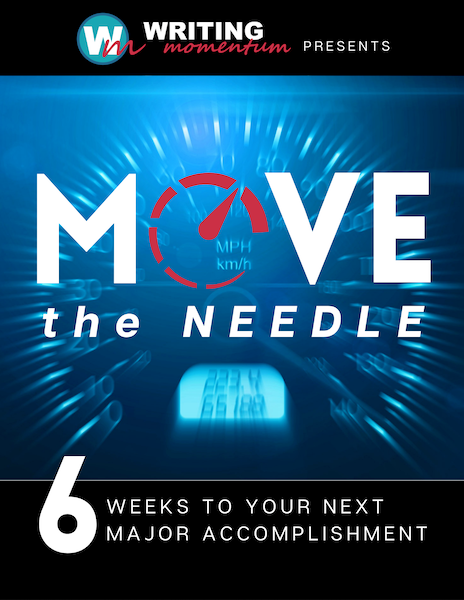Episode 123
Giving Your Writing Momentum Tip #3: Safe Spaces
In this episode of the Writing Momentum Podcast, hosts Christopher and Gena Maselli discuss the importance of finding and creating safe spaces for writers. They share personal experiences and tips for recognizing safe environments that foster growth, creativity, and supportive feedback in one's writing journey. Join them as they explore key elements of a safe space, signs of an unsafe space, and introduce Writing Momentum's own community as a hub for aspiring and seasoned writers. Tune in for valuable insights and discover how a supportive environment can significantly impact your writing progress.
- 00:00 Welcome to the Writing Momentum Podcast
- 00:23 The Great Beard Debate
- 01:32 Importance of Safe Spaces for Writers
- 02:54 What to Expect from a Safe Space
- 07:55 Signs You're Not in a Safe Space
- 11:14 Join Our Writing Community
- 13:08 Conclusion and Call to Action
LINKS:
- Liz Wilcox's Email Marketing Membership at http://wmdeal.com/liz
- Get your FREE Move the Needle goal-setting for authors ebook at https://www.writingmomentum.com
- Write with us! Join our writing membership and get your book DONE! https://www.writingmomentum.com/membership
Transcript
How can you find a safe space to grow in your writing?
Speaker:We can help with that.
Speaker:Hello and welcome to the Writing Momentum Podcast.
Speaker:I'm Christopher Maselli and I'm here with my wife,
Speaker:Gena Maselli.
Speaker:And hey look, Gena's back!
Speaker:I'm back!
Speaker:Yay!
Speaker:She wasn't here last week.
Speaker:For those of you who didn't tune in last week, I did a solo
Speaker:episode, which is pretty rare.
Speaker:It is.
Speaker:I bet it was great though.
Speaker:Well, you know, here's the thing.
Speaker:I had a beard.
Speaker:And so and so, those of you who are watching on YouTube, you saw my full
Speaker:scruffy beard and I think this is better.
Speaker:I think this is more natural.
Speaker:I just want you to know, uh, everyone that this has been a long
Speaker:conversation about whether or not Chris should have a beard or not.
Speaker:And whether he should try it.
Speaker:But she was fully supportive.
Speaker:And I finally got to a place where I said, you know what?
Speaker:I will support whatever you want to do.
Speaker:Go for it.
Speaker:You just can't do like a really big bushy grizzly Adam's beard.
Speaker:I didn't want that.
Speaker:Anyway, we let him try it and he came to his own conclusion that
Speaker:it was not for you, correct?
Speaker:That's right.
Speaker:I decided, well, yeah, it started to get really itchy.
Speaker:It started to get hot out here in the summer heat and it came in all white.
Speaker:So I was starting to look like Santa Claus.
Speaker:Well, I decided while you were gone.
Speaker:After I recorded the podcast, I'm like, you know what, I'm taking off the beard.
Speaker:Now I am beardless for those of you who are watching.
Speaker:If you're not watching, you can see that episode on YouTube.
Speaker:Or on our website, go to
Speaker:writingmomentum.
Speaker:com and you'll find it.
Speaker:It is what you might call a safe space.
Speaker:This is a safe space.
Speaker:And we wanted to talk about that today.
Speaker:We wanted to talk about this idea of safe spaces with writing
Speaker:because it really is so important.
Speaker:We cannot grow as writers if we are not in safe spaces.
Speaker:And when we talk about safe spaces, we're talking about these places
Speaker:that allow us to be wrong, allow us to be right, allow us to be wrong.
Speaker:And so, uh, we thought we'd go over that today.
Speaker:What does it mean to have a safe space?
Speaker:Yeah, I think I had a, I've had quite a few safe spaces as I've
Speaker:written in my writing career, right?
Speaker:Places that, uh, I could go and share my writing, places
Speaker:where I could get feedback.
Speaker:Sometimes it was with individuals, sometimes it was with groups of
Speaker:people or at like a conference.
Speaker:But all those became places where I knew, Hey, I can share what I've done
Speaker:here and, um, uh, actually get some good feedback on it because the people didn't
Speaker:have agendas where they were trying to you know, change what I was writing.
Speaker:They were just trying to help me.
Speaker:I think it's so important.
Speaker:I think that there have been many spaces where I have been, uh,
Speaker:that have been very safe for me.
Speaker:Although I have to admit there have been some times when it did not feel safe.
Speaker:And we want to talk about that too.
Speaker:How do you know when you're not in a safe space?
Speaker:So as we get started, let's just talk about what should someone
Speaker:expect, Chris, from a safe space?
Speaker:What should they be able to do?
Speaker:What should they be able to expect?
Speaker:So the first thing about a safe space is that you want to have a place
Speaker:where you can ask questions about your writing, about your manuscript, about
Speaker:your career in publishing, right?
Speaker:How publishing works and everything without feeling like you, um, you know,
Speaker:shouldn't be asking these questions or that someone's going to say something
Speaker:that's going to completely discourage you and pull you out of the writing game.
Speaker:And we have seen that happen.
Speaker:Oh yeah.
Speaker:You see people shut down.
Speaker:Cause here's the thing.
Speaker:You guys know this writing is an art.
Speaker:It is art.
Speaker:And when we get to the place where we are showing our art to the world,
Speaker:it's a very vulnerable place to be.
Speaker:And so we need to be around people that make us.
Speaker:That give us the allowance to grow.
Speaker:That give us that space to grow and to explore and to try new things and to maybe
Speaker:get it wrong, but maybe hit it out of the park and do something really spectacular.
Speaker:Yeah.
Speaker:So the other thing that we wanted to, what did you want to say?
Speaker:I was just going to say, feel, if you're in a place where you're
Speaker:writing and you're asking about your writing, you shouldn't feel silly to
Speaker:ask even the simplest of questions.
Speaker:You can ask whatever you want.
Speaker:We are all in this together.
Speaker:If you're somewhere where people feel like you're in competition with them, that
Speaker:is not necessarily a safe space, right?
Speaker:You want to be able to ask questions, have people give you answers, tell you
Speaker:just flat out how this thing works, this publishing thing, and then you
Speaker:can grow better at your writing.
Speaker:Absolutely.
Speaker:You need to be receiving supportive feedback.
Speaker:That's one of the things.
Speaker:You should be able to ask questions.
Speaker:You should also get supportive feedback on it.
Speaker:Uh, but supportive feedback in that, you know, maybe I wouldn't do it like this or
Speaker:have you thought about doing it like that?
Speaker:Or maybe you should think about changing that or, You know what?
Speaker:You've broken kind of a rule here.
Speaker:Have you thought about why you're breaking it?
Speaker:Or, uh, why maybe you shouldn't break it?
Speaker:You know, those kind of things.
Speaker:Someone to help you.
Speaker:And it doesn't mean that, you know, you have to be with someone who is
Speaker:super, super knowledgeable above you, but it needs to be around people
Speaker:that you can, uh, work together.
Speaker:There needs to be that collaborative effort there that you can work
Speaker:together and figure things out.
Speaker:Supportive feedback doesn't say, Hey, you're never going to get this published.
Speaker:This isn't good enough for the market.
Speaker:Too bad.
Speaker:Nothing you can do about it.
Speaker:That's not supportive feedback.
Speaker:We've heard writers get feedback like that.
Speaker:Supportive feedback says, well, this isn't quite where it should be yet, but I think
Speaker:I know how we can help you get it there.
Speaker:And let's look at some ideas for you.
Speaker:And then they don't redo it for you, right?
Speaker:But they give you the tools you need so that you can fix your manuscript
Speaker:and get it where it needs to be.
Speaker:Absolutely.
Speaker:And you need to be able to be accepted no matter your writing level.
Speaker:So if you're new and you think.
Speaker:Well, I've never been published.
Speaker:Again, a very vulnerable place to be, right?
Speaker:But if you've never been published before, you should be around people
Speaker:who support you and say, That's okay.
Speaker:That's okay.
Speaker:That's where you're starting.
Speaker:That's not where you're going to finish.
Speaker:And it shouldn't be like Chris said, Oh, this competition thing or this,
Speaker:uh, you're not quite, you don't quite measure up to us kind of thing.
Speaker:Oh, there's nothing that kind of gets me kind of riled up being around there
Speaker:because I think when people get to when they act like that or they say those
Speaker:kind of things, they're forgetting that at one point they were there.
Speaker:Yeah, that's the thing.
Speaker:Every one of us is a beginner at some time.
Speaker:Right?
Speaker:And even if you've been writing for many years, many times we
Speaker:are beginners at different parts of the writing process, right?
Speaker:We have friends who are very accomplished writers, but when
Speaker:it comes to self publishing, they feel like complete newbies.
Speaker:And that's fine, it's just that we're all good at different things, right?
Speaker:We've all, we're all, depending on our experience, we've just,
Speaker:uh, grown up in different areas.
Speaker:So yeah, you should be able to be accepted regardless of your writing level.
Speaker:And your publishing level, and your marketing level, right?
Speaker:Because like what you said, Chris, is so important.
Speaker:You may be a very accomplished children's book writer, picture book writer,
Speaker:and you may decide, you know what, I want to try my hand at chapter books.
Speaker:All of a sudden, you're back at square one, maybe not square one, but you're
Speaker:certainly not an expert in that genre.
Speaker:And so there's going to be things you're going to have to learn, things
Speaker:you're going to have to figure out.
Speaker:And you need to be in an area that really supports that learning process.
Speaker:So Chris, let me ask you.
Speaker:What are some signs that you are not in a safe place?
Speaker:Well, some of these things we've been talking about, right?
Speaker:You don't want to share your writing.
Speaker:You feel like, oh, if I do, someone's going to try to change
Speaker:it, or they're going to attack it, or I'm going to feel silly.
Speaker:Now, we will have butterflies like that, right?
Speaker:We all, anytime you're sharing something, it can be a bit vulnerable.
Speaker:So don't just take a feeling of vulnerability and feel like, oh,
Speaker:this means I'm not in a safe space.
Speaker:But if you're constantly, Feeling like that.
Speaker:Like, oh, every time I share something bad happens, that's not a safe space.
Speaker:That's not where you should be.
Speaker:Yeah, and I would say you also want to make sure that these
Speaker:people are telling you what they like about your writing as well.
Speaker:Not everything you write is going to be trash.
Speaker:Right.
Speaker:There's going to be something in there that is going to be that
Speaker:golden nugget that you can build on.
Speaker:And I'm not saying you might not need to start over and restructure some things.
Speaker:Maybe there's a character that doesn't make sense, or maybe you're writing a
Speaker:nonfiction book and you're, you really don't have a strong enough chapter
Speaker:one, which is a very common thing.
Speaker:Those things, yes, you can get feedback on that and get people, uh,
Speaker:people who will tell you, I really think you need to strengthen this.
Speaker:But you know what?
Speaker:I love what you did here.
Speaker:Or I think what you did here is a great start.
Speaker:Something to make you feel encouraged.
Speaker:Yeah.
Speaker:So one key thing to look for to see whether a place is safe or not is ego.
Speaker:Is there ego in the room?
Speaker:Is there, Several people or even just sometimes one person that overrides
Speaker:everything that you're, you know, hearing from other people or that tries to
Speaker:override you in your manuscript trying to tell you how to change everything, trying
Speaker:to, there, it seems like they come across as though they can't do any wrong, right?
Speaker:When you see that kind of ego, that's a good time to run.
Speaker:You don't need that in your life.
Speaker:None of us need that in our lives.
Speaker:So, and, and just look for people who are humble and who are willing
Speaker:to share because as we have said before, There is room for all of
Speaker:us in this thing and there's room for you and there's room for me.
Speaker:There's room for Gena.
Speaker:And so look for that kind of safe writing space without egos.
Speaker:Yes.
Speaker:I love what you said there.
Speaker:Humility is huge.
Speaker:Humility in any area of life is huge.
Speaker:And in the writing space, you know, every once in a while, I have been
Speaker:in spaces where you sit down at a maybe some kind of a table at a
Speaker:conference or something like that.
Speaker:And there's that, maybe that one person that wants to talk the entire time and
Speaker:just talk about all their accomplishments, everything that they've done.
Speaker:They've got feedback on everybody's writing and it's always with a little
Speaker:bit of an attitude of, you just can't quite be as good as me, but
Speaker:you're just gonna have to accept it.
Speaker:Those are the kind of situations that we're talking about with not safe spaces.
Speaker:And it really, is kind of a uh, point that just frustrates me when
Speaker:I see that because I do think that we all were at step one before.
Speaker:So, um, we hope that you are finding that you are in a safe space, that you have a
Speaker:writing partner that you can write with.
Speaker:And if you don't, guess what?
Speaker:We have a writing space online.
Speaker:We've tried very hard to make sure it is safe.
Speaker:It is accepting and it is a place you can grow in your writing
Speaker:And so it's at writingmomentum.
Speaker:com go there You'll see a link to the membership and we
Speaker:have a $25 a month membership.
Speaker:It's only the cost of a couple Starbucks drinks, really, for the month, and
Speaker:for that, we have literally hours and hours of video recorded training.
Speaker:We have writing time that we do together every single Wednesday,
Speaker:and you can ask questions.
Speaker:We're there to help answer them.
Speaker:We've got other very knowledgeable writers there who can help answer them.
Speaker:We can try to find the answers if we don't know them.
Speaker:And then we have roundtables coming up with Laurel Thomas,
Speaker:what we're very excited about.
Speaker:She deep dives into different areas of writing and
Speaker:Fiction.
Speaker:She deep dives into fiction, but it is a roundtable.
Speaker:It's not just her teaching.
Speaker:It's her sharing a principle for fiction, but then she pulls it out
Speaker:and she talks and it creates this beautiful environment where you're
Speaker:able to ask questions and give opinions and maybe help somebody else.
Speaker:It's just, it really is beautiful.
Speaker:And if you've ever been in anything, if you've met Laurel in person or you've
Speaker:been in one of her round tables, you will know she's a very gentle, kind person.
Speaker:She loves to help emerging writers, writers who are growing in the craft.
Speaker:So definitely check that out, but we hope you will join us.
Speaker:We hope you will and like I said, we have a lot of training
Speaker:We have a lot of training.
Speaker:We got a lot of things in there.
Speaker:We keep adding to it And so just go to writing momentum dot com slash membership.
Speaker:It's only $25 a month.
Speaker:There's no contract You can cancel anytime if you decide it's not for
Speaker:you, but we think that once you come in, you're going to be like,
Speaker:Wow, I have found my community.
Speaker:So, hey, if you've enjoyed this podcast, will you do rate, review,
Speaker:subscribe, and share it with others?
Speaker:If there's someone you know who needs to find a safe space or who you
Speaker:think, man, this, this kind of thing could really, charge their writing,
Speaker:really give them writing momentum themselves, please share this podcast
Speaker:with them and encourage them to listen.
Speaker:Until next time, remember that together
Speaker:we have writing momentum.
Speaker:Bye
Speaker:bye.





